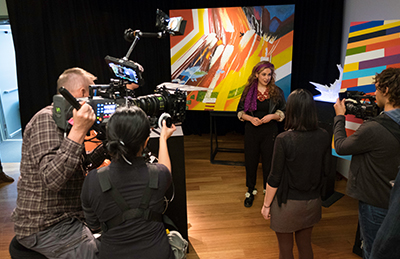NIDA today announces five new merit-based tuition scholarship opportunities for domestic students, for the 2017 intake to its popular Master of Fine Arts (MFA) courses in the performing arts and cultural leadership.

The National Institute of Dramatic Art (NIDA) today announces five new merit-based tuition scholarship opportunities for domestic students, for the 2017 intake to its popular Master of Fine Arts (MFA) courses in the performing arts and cultural leadership.
One domestic scholarship recipient will be chosen from each of NIDA’s Masters of Fine Arts degrees in: Cultural Leadership, Design for Performance, Directing, Voice (voice teaching), and Writing for Performance, which are all housed in the new state-of-the-art NIDA Graduate School building.
Scholarship winners will receive half-fee tuition funds to the value of $15,120 for full-time students, and $7,560 for part-time Cultural Leadership students for each of their two years of study.
‘The scholarships have been created to support Australia’s cultural future, and I look forward to seeing the diverse range of applicants for 2017,’ states NIDA Director of Education, Dr Melissa Laird.
‘We are looking for empathetic and imaginative performance-makers, creative practitioners and arts-professionals who demonstrate the skill, motivation and commitment to tell contemporary Australian stories, to shape Australia’s unique cultural landscape. We encourage all to apply for consideration,’ said Dr Laird.
All MFA course applicants will be considered for these scholarships and assessed by a panel at the time of their interview, using the five generic published criteria applicable to all NIDA MFA courses (outlined below), along with four further criteria which include evidence of:
- Leadership capacity and ambassadorial qualities
- Creative potential (risk-making and flexible thinking) demonstrated in the interview and through CV, audition, text-based statement or portfolio
- Completion of projects or study
- Discipline-specific expertise – criteria outlined in the course application form
With this scholarship announcement, NIDA has decided to extend the 2017 application deadline to Monday 17 October 2016 for all courses including its Bachelor of Fine Arts degrees and Vocational Diplomas.
Aspiring NIDA students can find out more about all the courses and scholarships on offer in 2017 and apply by visiting apply.nida.edu.au.
The National Institute of Dramatic Art (NIDA) is Australia’s leading institution for education and training in the dramatic arts. NIDA has grown to become a world leader, with a highly-regarded educational program of graduate and undergraduate degrees, vocational diplomas, open short courses, school-holiday programs, and corporate training.
For more than 50 years, NIDA graduates, such as Cate Blanchett, Hugo Weaving, Baz Luhrmann, Catherine Martin, Jessica Marais, Kip Williams, Sarah Snook and many, many more, have been recognised for their contribution to the success and vibrancy of the Australian and international arts and entertainment industries. Our actors, designers, writers, directors, and technical and production professionals go on to achieve acclaim on the stage, on screen, and at major cultural events, creating new ways to share stories with audiences around the world.
Generic Master of Fine Arts criteria:
We select students who:
- demonstrate commitment, motivation and passion in relation to the arts, entertainment and related industries, to their chosen discipline, and to the course of study
- provide evidence of their capacity to work creatively and imaginatively
- demonstrate an aptitude to collaborate with peers as part of a creative process
- demonstrate a range of knowledge, skills, technical abilities and/or problem-solving techniques relevant to their discipline
- demonstrate cultural and contextual awareness
- articulate and communicate ideas clearly

